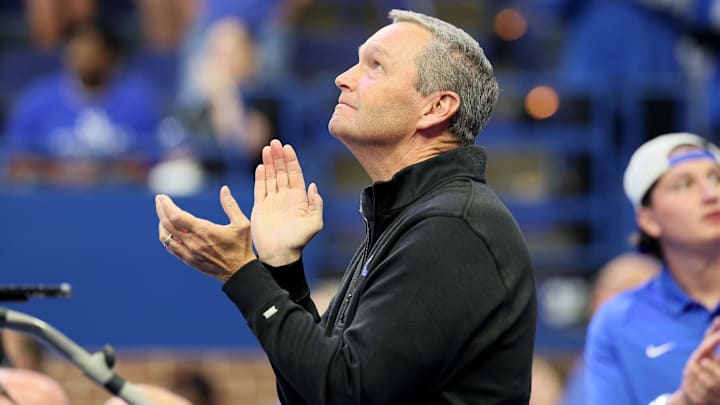Barnhart to the rescue?
Mitch Barnhart isn’t shouting from rooftops. He’s not firing off tweets. But behind the scenes, Kentucky’s longtime athletic director is quietly fighting to preserve something bigger than any NIL deal or transfer portal splash: the future of Olympic sports.
In an interview on KSR, Barnhart made it clear—while revenue distribution and NIL dollars are evolving, Kentucky won’t let the "non-revenue" sports fade into the background. Every fan knows that football and basketball are the engines of a program. But he went on to talk about how emotional it was to the Kentucky's "pitch" that sent them to the College World Series in Omaha, or Sydney McLaughlin chase gold on the world stage after tracking them down at Kentucky.
Kentucky Sports MATTERS!
— Kentucky Sports Radio (The Show) (@KSRTHESHOW) August 1, 2025
Mitch Barnhart thinks so. pic.twitter.com/WxQgKRBm9g
And he’s right. Kentucky’s identity isn’t built on two sports alone. It's built on track excellence, baseball breakouts, volleyball dominance, and yes—basketball and football banners. Barnhart’s vision is holistic: “Tell us what you need,” he said, a message to every coach under his umbrella—from Mark Stoops to Kenny Brooks.
That approach is more vital now than ever.
With the House v. NCAA settlement forcing schools to reevaluate how they allocate resources, many fear that Title IX-compliant Olympic sports will be first on the chopping block. Barnhart is pushing back. Quietly but firmly, he’s working to ensure that those programs don’t just survive—they thrive.
He hasn’t outlined exactly how Kentucky will distribute its new revenue obligations. But the tone is clear: UK will do what it takes to stay competitive across the board. That includes investing in the coaches, infrastructure, and athletes who don’t always make national headlines—but who still wear the Wildcat uniform with pride.
In a moment where many ADs are hedging or retreating, Mitch Barnhart is leaning in. Because for him, saving college sports means saving all of it—not just the parts with prime-time TV slots.
